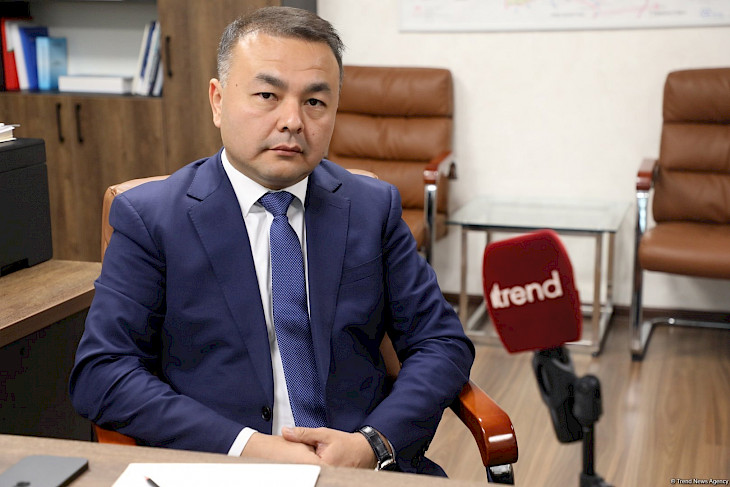Uzbekistan, Azerbaijan, and Kazakhstan will create a joint venture to implement the Green Corridor project, Deputy Energy Minister of Uzbekistan Umid Mamadaminov told Trend in an exclusive interview.
“At COP29, Uzbekistan, Azerbaijan, and Kazakhstan are expected to sign an intergovernmental agreement, which will be a milestone for the initiative. This agreement will kick-start the project, which will lead to rapid progress in its development. The three countries had already signed a memorandum of understanding earlier this year. We are engaging the consulting firm CESI (Centro Elettrotecnico Sperimentale Italiano) to conduct a feasibility study. The feasibility study procedure will take about a year, after which construction will begin. Several IFI institutions are also expressing interest in financing this green project. It is expected that construction will take about 3-4 years. In addition, by 2030, the infrastructure and generating capacity (Wind and Solar generation) in the northwestern region of Uzbekistan will be fully ready,” he said.
Mamadaminov noted that Uzbekistan, Azerbaijan, and Kazakhstan have ambitious goals to integrate renewable energy into their energy infrastructure. The three countries are initiating a significant transcontinental effort to deliver renewable energy to Europe. This initiative will leverage the significant green generation capacity being developed in Uzbekistan, particularly in wind and solar power, along with Kazakhstan’s capabilities to enable the transmission of renewable energy across the Caspian Sea, Azerbaijan, Georgia, and ultimately to Europe via the Black Sea and Romania.
The deputy minister stated that the renewable project involving Uzbekistan, Azerbaijan, and Kazakhstan is expected to yield significant advantages for all involved countries. This initiative will empower these nations to enhance revenue, generate employment, and substantially decrease carbon emissions. The integration of electricity networks among these nations will optimize resource usage, enabling each country to leverage its distinct advantages for the collective benefit. Uzbekistan has considerable potential in wind and solar energy, particularly with substantial wind capacity in the northern region. By developing the requisite infrastructure for power transmission to Europe, this potential can be efficiently utilized.
“The project will use high-voltage direct current (HVDC) technology, which is necessary for efficient transmission of electricity over long distances (more than 1,000 km) with low energy losses. The HVDC submarine cable will create a sustainable infrastructure for the export of electricity to Europe. By 2030, energy consumption in Uzbekistan is projected to reach more than 130 billion kWh. However, the expected surplus generated by solar and wind resources will provide sufficient energy for export,” he noted.
Umid Mamadaminov stressed that European nations have committed to reaching net-zero greenhouse gas emissions by 2050 as part of their climate goals. The supply of green energy from Central Asia will significantly reduce Europe’s dependence on fossil fuels and facilitate the transition to renewable sources.
The deputy minister emphasized that other stakeholders, the government are welcome to join this initiative. Our neighboring countries, including Kyrgyzstan and Tajikistan, are interested in participating in the initiative and the rich hydropower resources of those countries will create a balanced continuous electricity supply to the EU.
“Uzbekistan, Kazakhstan, and Azerbaijan are investing heavily in renewable energy to improve their energy systems. Azerbaijan offers significant experience in solar and wind energy development, which is in line with Uzbekistan’s goal of significantly reducing carbon emissions as outlined in the Paris Agreement. Uzbekistan has committed to achieving a 35 percent reduction in greenhouse gas emissions by 2030, while Azerbaijan has set comparable targets,” he noted.
The deputy minister highlighted that Uzbekistan has positioned itself as a central player in green energy in Central Asia in recent years, having signed more than 20 gigawatts of renewable energy projects, including more than 12 gigawatts of wind and more than 8 gigawatts of solar capacity. Uzbekistan’s renewable capacity is expected to exceed 4,000 megawatts by the end of this year, and forecasts indicate that it will double to more than 7,500 megawatts by the end of next year.
Another important point suggested by Mamadaminov is that the successful integration of intermittent energy sources (solar and wind power) requires the creation of a robust infrastructure. This includes the development of enough transmission lines, the introduction of digital automation systems that will operate with advanced weather forecasting, the availability of reserve capacity (BESS, pumped hydro, small gas turbines) for quick ramp-up and ramp-down generation for balancing power system, and
development of capacity building to have a qualified management team. The importance of these elements cannot be overstated for countries seeking to integrate renewable energy into their power systems. The geographical distribution of generation sources often requires the creation of extensive transmission networks to link remote generation sites with consumption centers.
“In Uzbekistan, renewable generation is primarily located in the northwestern and western regions, including Navoi, Bukhara, Kashkadarya, and Karakalpakstan, while the central and western part of the country has the highest consumption. This requires significant investment in transmission lines to facilitate the movement of energy from generation sites to demand areas. Uzbekistan is focusing on advancing battery energy storage projects, having already signed agreements for more than 2,000 megawatts (with more than 4,000 MWh capacity), where 300 megawatts (more than 600 MWh capacity) are expected to be operational by the end of this year. The implementation of large-scale battery energy storage initiatives plays a critical role in stabilizing the energy system, ensuring reliable electricity supply while addressing the fluctuations associated with renewable energy sources,” he added.
Source: Trend.az
CentralasianLIGHT.org
November 7, 2024

